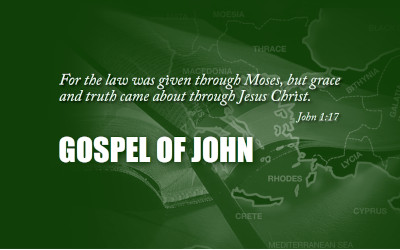John 1:1-32
In the beginning. A testament to the light. Born by God. Grace and truth. Law vs grace&truth. He has made God known. Why Jesus was baptized.
(Bấm vào đây để đọc tiếng Việt)
IN THE BEGINNING
 "1 In the beginning was the Word, and the Word was with God, and the Word was fully God. 2 The Word was with God in the beginning. 3 All things were created by him, and apart from him not one thing was created that has been created. 4 In him was life, and the life was the light of mankind. 5 And the light shines on in the darkness, but the darkness has not mastered it." (John 1:1-5)
"1 In the beginning was the Word, and the Word was with God, and the Word was fully God. 2 The Word was with God in the beginning. 3 All things were created by him, and apart from him not one thing was created that has been created. 4 In him was life, and the life was the light of mankind. 5 And the light shines on in the darkness, but the darkness has not mastered it." (John 1:1-5)
As commonly understood, the focal point of this book, the Gospel of John, revolves around Jesus—his presence alongside the divine trinity since the inception of the world, as he undertook its creation.
In the beginning God created the heavens and the earth. (Genesis 1:1)
A TESTAMENT TO THE LIGHT
“6A man came, sent from God, whose name was John. 7He came as a witness to testify about the light, so that everyone might believe through him. 8He himself was not the light, but he came to testify about the light.” (John 1:6-8)
The individual referred to as “sent from God” in this context is none other than John the Baptist. In his Gospel, the author, also named John, takes great care to clarify that John the Baptist is not the light, but rather that he came to bear witness to the true Light, who is none other than Jesus Christ.
BORN BY GOD
“9 The true light, who gives light to everyone, was coming into the world. 10 He was in the world, and the world was created by him, but the world did not recognize him. 11 He came to what was his own, but his own people did not receive him. 12 But to all who have received him - those who believe in his name - he has given the right to become God’s children 13 - children not born by human parents or by human desire or a husband’s decision, but by God.” (John 1:9-13)
The fact that Jesus, who created the world, was not recognized by the world, and that his own people did not receive him, shows us how spiritually blind we are. However, God has made it possible for us to become his children through faith, by simply receiving his gift of salvation in Christ.
This inclination to rely on human means is further demonstrated in the encounter between Jesus and Nicodemus in chapter 3. Nicodemus was a learned and religious man, but he completely misunderstood what it takes to enter God’s kingdom. He thought that it was necessary to follow a certain set of rules or rituals, but Jesus told him that it was necessary to be born again, which is a spiritual transformation that can only be accomplished by the power of the Holy Spirit.
GRACE AND TRUTH
“14 Now the Word became flesh and took up residence among us. We saw his glory - the glory of the one and only, full of grace and truth, who came from the Father. 15John testified about him and shouted out, “This one was the one about whom I said, ‘He who comes after me is greater than I am, because he existed before me.’” 16For we have all received from his fullness one gracious gift after another.” (John 1:14-16)
Many years ago, when I was still new to the New Covenant, a Christian sister told me that our lives as believers must be balanced between God’s grace and obedience to his commandments. I didn’t have a strong understanding of God’s grace at the time, so I couldn’t disagree with her, even though I felt something was wrong. She believed that the law was the foundation of truth.
Now I know that’s not true. The truth is that we are saved by faith in Jesus Christ, not by obedience to the law. This is clear from verses 12 and 17. Verse 12 says that “to all who have received him - those who believe in his name - he has given the right to become God’s children.” Verse 17 says that “the law was given through Moses; grace and truth came through Jesus Christ.”
In other words, the law was a temporary measure that pointed to the need for a Savior. Jesus Christ is the fulfillment of the law, and he has saved us by his grace through faith. We don’t need to try to earn our salvation by following the law; we can simply receive it as a free gift from God.
Since salvation is an unmerited gift bestowed upon us by God, the same principle applies to all subsequent blessings we receive. Works have no place in our lives after salvation, emphasizing that the righteous are to live by faith. Therefore, it can be said that we receive “once gracious gift after another.”
LAW vs. GRACE&TRUTH
“17 For the law was given through Moses, but grace and truth came about through Jesus Christ.” (John 1:17)
This verse from the Gospel of John clearly contrasts the law and grace/truth. The law was given through Moses, while grace and truth came through Jesus Christ. Moses relied on the law, which led him to strike the rock twice instead of speaking to it as God had instructed him. As a result, God forbade Moses from entering the Promised Land. This event serves as a warning to us all that we should not rely on the law to save us, but rather on grace and truth, which are found in Jesus Christ.
HE HAS MADE GOD KNOWN
“18 No one has ever seen God. The only one, himself God, who is in closest fellowship with the Father, has made God known. (John 1:18)
The law with its commandments cannot reveal God to us. Instead, it hides God from us, just like what it did to Adam and Eve after it came into their hearts in the form of the knowledge of good and evil. The only way to know God is through Jesus Christ. He is the one who tore the curtain that separated us from God and gave us access to the Father.
WHY JESUS WAS BAPTIZED
“19 Now this was John’s testimony when the Jewish leaders sent priests and Levites from Jerusalem to ask him, “Who are you?” 20 He confessed - he did not deny but confessed - “I am not the Christ!” 21 So they asked him, “Then who are you? Are you Elijah?” He said, “I am not!” “Are you the Prophet?” He answered, “No!” 22 Then they said to him, “Who are you? Tell us so that we can give an answer to those who sent us. What do you say about yourself?” 23 John said, “I am the voice of one shouting in the wilderness, ‘Make straight the way for the Lord,’ as Isaiah the prophet said.” 24 (Now they had been sent from the Pharisees. ) 25 So they asked John, “Why then are you baptizing if you are not the Christ, nor Elijah, nor the Prophet?” 26 John answered them, “I baptize with water. Among you stands one whom you do not recognize, 27 who is coming after me. I am not worthy to untie the strap of his sandal!” 28 These things happened in Bethany across the Jordan River where John was baptizing. 29 On the next day John saw Jesus coming toward him and said, “Look, the Lamb of God who takes away the sin of the world! 30 This is the one about whom I said, ‘After me comes a man who is greater than I am, because he existed before me.’ 31 I did not recognize him, but I came baptizing with water so that he could be revealed to Israel.” 32 Then John testified, “I saw the Spirit descending like a dove from heaven, and it remained on him.” (John 1:19-32)
As indicated in Hebrews, specifically in chapters 9 and 10, the law serves as a mere representation of future realities. It is through “the Lamb of God” alone that the sins of the world can be permanently absolved. Consequently, we are liberated from the burdensome obligation of offering sacrifices for every individual transgression, finding solace in the knowledge that Jesus has eternally atoned for all sins.
Jesus was baptized by John the Baptist so “he could be revealed to Israel.” Other than this, I believe that the water baptism John the Baptist performed to other Israelites carried a different meaning than what we’re doing in churches today.
Nghi Nguyen
- Scripture quoted by permission. All scripture quotations, unless otherwise indicated, are taken from the NET Bible® copyright ©1996-2006 by Biblical Studies Press, L.L.C. All rights reserved.
Disclaimer: This is my own opinion on the topic, which does not necessarily reflect the church's theology, or beliefs of the individuals in it — Nghi Nguyen
